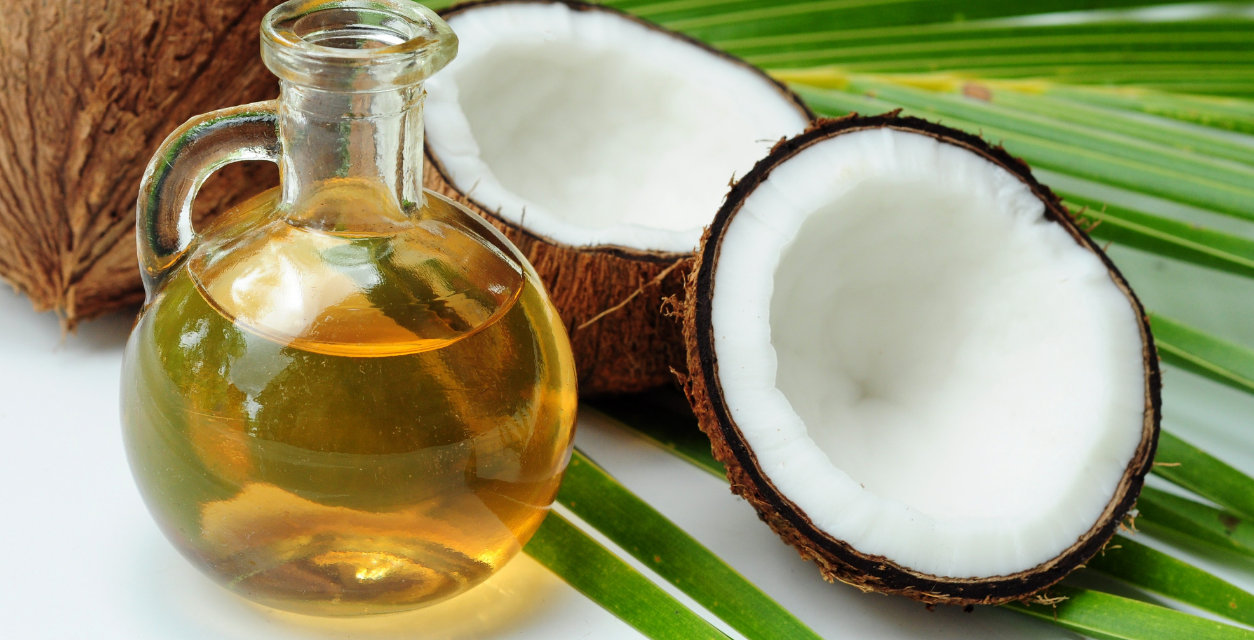Part 2 of the Tropical Oil Series
Ahhh coconut oil. If you believe everything you read about this uber-popular health food, you’d believe it to be the cure you’ve been looking for to help you lose weight and improve your immune system, your heart health, as well as your memory. Oh, and don’t forget what it does for your skin and hair!
So, what’s the real story on this fat? Coconut oil is considered a saturated fat, on par with butter; coconut oil is 82% saturated and butter is 63% saturated. All fats are a combination of different fatty acids and each fatty acid can affect the body differently. (Decades of heart disease and lipid research have concluded that the higher the saturated fat in your diet, the higher your cholesterol and thus your risk of heart disease. The American Heart Association recommends that your diet have no more than 10% total saturated fats, including plant-based fats like coconut and palm oil.)
Coconut oil is about 62% medium chain triglyceride (MCT), which the body uses differently than other fats. MCT’s go straight to the liver to be metabolized, which makes it a quick energy source sometimes tapped into by athletes. This oil also produces some ketones when broken down, which is why coconut oil may help reduce hunger and is also popular with ketogenic diets.
Lauric acid is the main fatty acid found in coconut oil—about 48%. Lauric acid from Virgin coconut oil has been shown to have antimicrobial effects against several bacterial bad boys including Staphylococcus aureus, and also against the bacteria that can lead to acne, Propionibacterium acnes. Coconut oil also shows promise in decreasing the growth of cancer cells.
Coconut oil contains phenolic compounds or phenols, which provide antioxidant benefits in the body. You’ve probably heard the term “phenols” around discussion of raspberries, grapes, kale, berries and cocoa because they are also very rich in phenols. Different ways of processing coconut oil affects the quality and thus health benefits of the oil. Virgin coconut oil is made by natural or mechanical means without chemical refining. Even within the virgin coconut oil category, hot pressed oil contains more phenols and also has more anti-inflammatory activity than virgin coconut oil made by the fermentation process method.
Heart Disease, Weight Control and Coconut Oil: More Research Needed
Because the MCT oil found in coconut oil is used as energy immediately, it’s not stored as fat, suggesting it could help with weight loss. But the research on this is conflicting.
The evidence on coconut oil and heart disease is also not conclusive. Studies have shown that coconut oil raises both LDL (bad cholesterol) and to a lesser extent HDL (good cholesterol). The rise in HDL partially balances out the rise in LDL. A short-term, smaller study that compared diets with virgin coconut oil, butter or olive oil showed that coconut oil and olive oil didn’t significantly raise LDL cholesterol, though butter did. Coconut oil also significantly increased HDL levels compared to butter and olive oil.
What about Skin and Hair?
Because of coconut oil’s antibacterial benefits, it’s been shown to improve the scalp microbiome (Yes, that’s a thing!) and decrease dandruff. The anti-inflammatory effects of virgin coconut oil, when applied to the skin, could improve atopic dermatitis and eczema. Coconut oil has been used for generations as a moisturizer and in animal studies, has been shown to help with wound healing.
What’s the Bottom Line?
Coconut oil does show promise due to its antibacterial and anti-inflammatory properties, though the jury is still out on if will help with weight loss or heart disease risk. If you follow the Heart Association’s guidance of eating no more than 10% saturated fat, that would be no more than 22 grams saturated fat if you eat 2,000 calories of balanced macronutrients in a day. All food contains some saturated fat, so if you decide to use coconut oil regularly, you’d probably want to limit it to no more than 2-3 teaspoons (8-12 grams of fat) per day. If you eat less than 2,000 calories (as most women do) you’d want to cut back on that amount. Coconut oil is a great skin moisturizer, especially in the winter!













